
29.01.2017
Neue Veröffentlichung: Virtues, Principals, and Agents
Teil des Sammelbandes Handbook of Virtue Ethics in Business and Management ist ein Beitrag von Alexander Brink. Aus dem Abstract:
Virtues play an increasingly important role in management science which is substantially shaped by corporate governance theory. Based on the principal-agent model – the academic core of corporate governance – virtues can, basically, be connected with both the principal (virtues of the principal) and/or the agent (virtues of the agent). Furthermore, virtues can be merged with the supervisory board as a kind of second level agent who governs the management in the interest of the principal (virtues of the second level agent). Section “Virtues at the Individual Level: Three Loci of Principal Agent Relationships” addresses these three loci of virtues in corporate governance relationships at the individual level. In the following two chapters and on the corporate level, an adaption – with some theoretical deviation from the traditional understanding of shareholder value maximization – is presented by omitting an assumption, respectively. First, one can disregard the standard economic theory assumption, in which only the shareholder holds the role of a principal. Hill and Jones suggest an agency theory which is based on multiple principal-agent relations in sections “Virtues and Stakeholder Agency Relationship”. Second, one can refrain from the assumption that virtues are connected with real persons. By reconstructing the organization as a legal entity (not as a person) with its own intention (French) and its own character (Wieland) or even as a hybrid type of organization (Boatright), virtues have various meanings in sections “Virtues and Corporations as Legal Entities” and “Virtues of Corporations and For-Profit Social Enterprises”. The contribution at hand finalizes with a conclusion and some challenges in section “Conclusion”.
Hier geht es zum Sammelband, den Beitrag von Alexander Brink finden Sie an dieser Stelle.